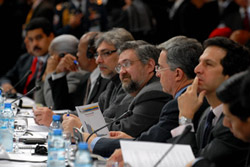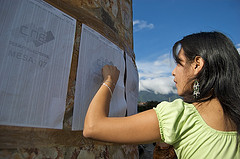Energy is ever more becoming the piston driving Latin America to the contemporary world stage.
This reality arrives in lieu of major Chinese and Russian investments in Venezuela’s petroleum belt, Mexico’s intense debate over how to diversify foreign investment in its state-run energy powerhouse, and Brazil’s ever-expanding oil coffers that continue to propel its economy upward in the face of a global economic recession.
These three states lead energy production in Latin America and will increasingly become a lifeline for the world’s swelling consumer demand, and key to its sustainable growth. Petroleum and natural gas have for a time been assets sought heavily by the US and Europe, but now draw clientele from the surging populace of China, India, and wider Eurasia.
Amid this equation, guaranteed global supplies remain variable, tending to degrade in both refining ease and reserve accessibility. This, coupled with security concerns in the Middle East, marks a unique opportunity for the region to fund much needed domestic reform and present viable energy initiatives to the international community, beyond the distant third tier.
A fundamental challenge in scaling these energy companies to meet such global demand will be the state’s ability to balance its investment and revenue model. All three of these Latin American countries highlighted here have state-run energy sectors, though all are not created equal. For a more informative look, see the comparative breakdown below:
 |
 |
 |
|
| Country |  México México |
 Brazil Brazil |
 Venezuela Venezuela |
| Founded | 1938 | 1953 | 1975 |
| Petro Profile | Heavy Crude (2/3, Maya), Light Crude (1/3, Isthmus & Olmeca) | Predominantly Heavy Crude (Marlim), although newly discovered, subsalt fields are of Light grade and Sweet substance | Almost entirely Extra-Heavy Crude, of Sour substance (high sulfur) |
| Proven Reserve Capacity | 10-13.68 billion | 12.35 billion | 99 billion |
| Largest Reserve | Cantarell | Sugar Loaf | Orinoco Belt |
| Onshore / Offshore % | 20/80 | 40/60 | Predominately onshore reserves, spread across 4 principal fields. Shallow water reserves in the Maracaibo Basin |
| Production Output | 2.8 million bbl/d | 2.72 million bbl/d | 1.5 million bbl/d |
| Refining Capabilities | 1.5 million bbl/d (6 refineries) | 2.223 million bbl/d (16 refineries) | 1.28 million bbl/d (Domestic & foreign refineries- Citgo USA) |
| Annual Revenue | US $98 Billion (2008) | US $118.3 billion (2008) | US $120 billion (2008), est. US $50 billion (2009) |
| Foreign Investors | Sparse due to tight regulation by state apparatus, although the Calderón adminstration has opened doors for foreign investment on the deep sea exploration front | Private sector energy (Shell, Cheveron), BP (biofuels), China | Previous investors included major intl. petroleum giants, but after state reappropriation, Russia, Iran, China, & Brazil have agreed to looser terms under the Bolivarian regime |
| Principal Export Recipient(s) | United States | Largely utilized for growing domestic consumption, biofuels (ethanol) make up bulk of energy export | United States & Europe, China fastest growing consumer |
SOURCES: US Energy Information Administration, Oil & Gas Journal, Business Week, CIA World Factbook
These numbers are enlightening in the sense that they present a snapshot of current carrying capacity and orientation of each state’s petroleum sector. However, a deeper study of energy futures can prove to be a bit speculative.
In the case of México, PEMEX has long been the case study on state investment of natural resource and economic autonomy. It relies heavily on taxes from its rich output to fund an array of federal initiatives and deliver energy to the Mexican consumer at a subsidized price. But, wrought with declining output on its principal oil field, Cantarell, the company has a need to exploit deeper off-shore deposits that require sophisticated equipment and a niche expertise– tasks honed upon by transnational powerhouses such as ExxonMobil, BP, and other state companies such as PETROBRAS. Due to this shifting source dynamic, the Calderón administration has worked diligently to promote external investment. This however remains a major political hot button due to historic precedent, as the industry’s sovereignty is seen as a sacred right to the Mexican populace. PEMEX has more than the necessary resources to carry onward, but significant institutional reform will remain fundamental.
PETROBRAS has gained measurable authority in the international energy sector both for the diversification of its investments, and the expertise of its workforce. President Luiz Inácio Lula da Silva has worked diligently to build a state model that profit shares with private enterprise, while promoting a solid domestic refining infrastructure. Recent offshore discoveries in sub-salt reserves via the Tupi fields continue to grow the Brazilian lot, while Brazilian officials are aiming to funnel revenue to direct state initiatives and maintain energy independence. For the time being, Brazil appears to be playing its cards right to promote sizable production in means to maximize internal growth. It will be interesting to see when it goes net positive in its production, to which countries it will direct its resources.
Turning to the more volatile petroleum sector, Venezuela has seen its share of production ebbs and waves in the past decade. President Hugo Chávez has too tapped into the ‘petro vein’ to fund large swaths of state initiatives, however often with a playbook at odds with much of its professional workforce. Lack of international investment (due to restrictive reappropriation efforts) and flight of expertise have reduced export capacity and bogged down exploratory projects in the Llanos sector and Orinoco Basin. The state energy company, PDVSA, however sits upon perhaps the world’s largest crude reserves in the Orinoco Belt, rivaling fields in Saudi Arabia. Due to its heavy tar-like viscosity though, special refining capabilities are needed to extract petroleum from sand and sludge– a role the United States currently fulfills. This is where large investment by China and Russia will float PDVSA initiatives in the near future despite waste from within. This, while the Venezuelan state maintains institutional direction and pads its GDP.
Overall, with the exception of Brazilian offshore reserves, it appears that most new petroleum pools are of heavier grade crude. This will require a more expensive refining process and specialized facilities, promoting favorable conditions for foreign direct investment (FDI) and transnational partnerships.
The manner in which each of these companies respond to its new role in the world energy sector will be developments watched closely by all, but seems to present favorable prospects to a long-forgotten region.




